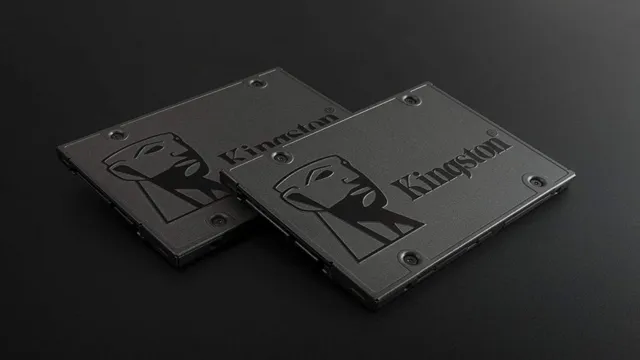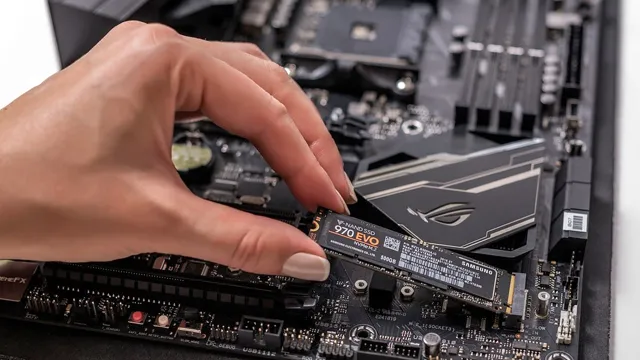When it comes to gaming, speed matters. A slow computer can really kill the experience, with sluggish frame rates and long load times causing frustration and boredom. That’s why many gamers opt for solid-state drives (SSDs) over traditional hard disk drives (HDDs) for improved speed and performance.
But just how much of a difference does SSD speed make for gaming? Is it worth the investment? In this blog, we’ll explore the world of SSDs for gaming, talking about speeds, performance, and everything else you need to know to make an informed decision about your next storage upgrade. So grab your controller, sit back, and let’s get started!
What is an SSD?
When it comes to gaming, the speed of your SSD can greatly impact your overall gaming experience. For smooth gameplay, an SSD with a read speed of at least 500MB/s is ideal. However, for those who are looking to take gaming to the next level, investing in an SSD with a read speed of 1GB/s or higher can provide lightning-fast load times and greatly reduce any lag or stuttering during gameplay.
Keep in mind that while read speed is important for gaming, there are other factors to consider such as capacity and durability. So, it’s important to do your research before making a purchase and ensure that the SSD you choose is capable of meeting your gaming needs.
Explanation of SSD technology
An SSD, or Solid State Drive, is a type of storage device that uses NAND-based flash memory to store data. Unlike traditional hard disk drives that use spinning disks to access data, SSDs have no moving parts, which makes them faster, quieter, and more reliable. An SSD works by storing data in memory cells that are managed by a controller chip.
The cells are organized into pages, and the pages are organized into blocks. When data is written to an SSD, the controller chip sends an electrical charge to the memory cells, which changes the state of the cells to either a “1” or a “0”. When data is read from an SSD, the controller chip retrieves the charge from the memory cells and converts it into data.
SSDs are popular in desktop and laptop computers because they offer faster boot times, faster application launches, and faster file transfers. They also consume less power than traditional hard drives, which can improve battery life in laptops. Overall, SSDs offer a significant performance boost over traditional hard drives, making them a popular choice for computer users who demand speed and reliability.

Why Does Speed Matter for Gaming?
When it comes to gaming, speed matters. The faster your computer can process information, the smoother your gameplay will be. So, how fast does an SSD need to be for gaming? It depends on the game and your personal preferences.
If you’re playing a fast-paced game with high graphics requirements, you’ll want an SSD with a high read/write speed. A faster SSD means shorter load times, quicker access to files, and less lag in gameplay. However, if you’re playing a less demanding game, you may be able to get by with a slower SSD.
Ultimately, it all comes down to what you’re looking for in terms of performance and how much you’re willing to invest. Consider your needs and do your research to find the best SSD for you.
Impact of SSD speed on gaming performance
Having a fast SSD can greatly impact your gaming performance. This is because games nowadays require a lot of data to be loaded onto your computer. The faster your SSD is, the quicker it can load that data, allowing you to play games seamlessly without any frustrating lag or delays.
It also means that you can spend less time waiting for your game to load, and more time enjoying your gaming experience. In fact, loading screens can take up a significant amount of time during gameplay, and a speedy SSD can drastically reduce that time. So, if you’re serious about gaming and want the best performance possible, investing in a fast SSD is definitely worth it.
What Speed Do You Need?
When it comes to gaming, the speed of your SSD can play a crucial role in your overall experience. So, how fast does an SSD need to be for gaming? Well, it depends on the types of games you play and how demanding they are. If you’re playing lighter games that don’t require much processing power, then a mid-range SSD with average speed will suffice.
However, if you’re playing high-intensity games, you’ll want an SSD with much faster speeds. Generally, a minimum read and write speed of 500 MB/s is recommended for gaming. Anything above that will undoubtedly provide a smoother and quicker gaming experience, minimizing load times and improving overall game performance.
So, if you’re a serious gamer, consider investing in an SSD that can keep up with your demanding needs and ensure you get the most out of your gaming experience.
Minimum and recommended speeds for gaming
Gaming is a popular pastime for people of all ages, but not all internet speeds are created equal when it comes to online gaming. The minimum speed you need for gaming will depend on the type of game you’re playing, but generally, a download speed of at least 3 Mbps and an upload speed of at least 0.5 Mbps is recommended.
However, if you want the best gaming experience with minimal lag or buffering, you’ll want to aim for higher speeds. For online multiplayer games, you’ll want a download speed of at least 10 Mbps and an upload speed of at least 1 Mbps. If you’re a hardcore gamer, you may want to consider even faster speeds, such as 25 Mbps download and 3 Mbps upload.
Keep in mind that your internet speed can also be impacted by other factors, such as the number of devices using the network at the same time and your geographic location. So, before signing up for a new internet plan, be sure to research what speeds are available in your area and choose one that meets your gaming needs.
How to Choose an SSD for Gaming
When it comes to gaming, speed is of the essence, and choosing the right SSD can make all the difference in your gaming experience. The question “how fast does SSD need to be for gaming” is a common one, and the answer depends on several factors. First, consider the type of game you’ll be playing – if it requires swift load times and frequent data access, you’ll benefit from a faster SSD.
Similarly, your computer’s other components will impact how fast your SSD needs to be. If you have a high-end graphics card and CPU, a higher-speed SSD will complement those components and make for smoother gaming. On the other hand, a slower SSD may be sufficient if you have less powerful components.
Ultimately, it’s important to balance the cost of an SSD with its performance – a blazing-fast SSD may not be necessary or worthwhile if you’re on a tight budget.
Important factors to consider when buying an SSD
If you’re a gamer looking for a faster way to read and write data, an SSD is the way to go. But, before selecting one, there are some important factors to consider. When choosing an SSD for gaming, look for a drive with high read and write speeds.
Seek out one with a fast I/O speed, which will help cut down on load times. You should also consider the type of NAND flash memory the SSD uses. SLC NAND flash memory is the quickest, while MLC memory is a balance of speed and capacity.
When it comes to size, a 1TB SSD is a great start. However, if you’re someone who plays a lot of high-performance games, then you might want to consider a larger model. Overall, if you want to experience faster load times and a more responsive gaming experience, then investing in a high-quality SSD is a smart decision.
Top SSDs for Gaming
When it comes to gaming, an SSD’s speed can have a significant impact on your overall gameplay experience. So, how fast does an SSD need to be for gaming? A good rule of thumb is to look for an SSD with a read/write speed of at least 500MB/s. However, keep in mind that faster is always better when it comes to SSDs for gaming.
A faster SSD can significantly reduce loading times and improve your gaming environment’s overall performance. A high-end SSD with read/write speeds of up to 3,500MB/s will ensure fast game loading times and smooth game performance. So, if you’re looking for the best SSD for gaming, aim for the highest read/write speeds you can afford.
A faster SSD will not only improve your gaming experience but also benefit your overall computer performance.
List of recommend SSDs for gaming
If you’re an avid gamer, investing in a quality solid-state drive (SSD) can truly enhance your gaming experience. SSDs deliver faster load times, reduced stuttering, and increased overall performance, resulting in an optimal gaming environment. There are various top-performing SSDs available on the market specifically designed for gaming.
One of the best choices available is the Samsung 970 EVO Plus SSD, which offers impressive read and write speeds, making it perfect for gamers who enjoy multitasking. The WD Black SN750 NVMe SSD is another top-performing SSD with impressive sequential read speeds of up to 3,470 MB/s, offering faster game loading times and reduced load time lag. Additionally, the Crucial MX500 SSD delivers extremely high read and write speeds, resulting in a faster performance rate and enhanced gameplay.
Other notable SSDs for gaming include the Adata XPG SX8200 Pro, Kingston KC2000, and Seagate FireCuda SSD. Consider investing in one of these high-performing SSDs to elevate your overall gaming experience.
Conclusion
In summary, the speed of an SSD for gaming really depends on the level of performance you’re looking for. Are you content with a leisurely stroll or do you demand to move like Usain Bolt? The faster the SSD, the quicker your games will load and the smoother your gameplay will be. So, if you want to cut down on those pesky load times and have a seamless gaming experience, a speedy SSD is definitely worth the investment.
Just remember, performance always comes at a price!”
FAQs
What speed of SSD is recommended for gaming?
It is recommended to have an SSD with a read speed of at least 500 MB/s for a smooth gaming experience.
Can a slower SSD affect gaming performance?
Yes, a slower SSD can result in longer load times and affect overall gaming performance.
Is NVMe SSD faster for gaming than SATA SSD?
Yes, NVMe SSDs have faster read and write speeds than SATA SSDs, resulting in faster loading times and better gaming performance.
Does the size of the SSD affect gaming performance?
The size of the SSD does not directly affect gaming performance, but having more storage can allow for the installation of more games and faster access to game files.
